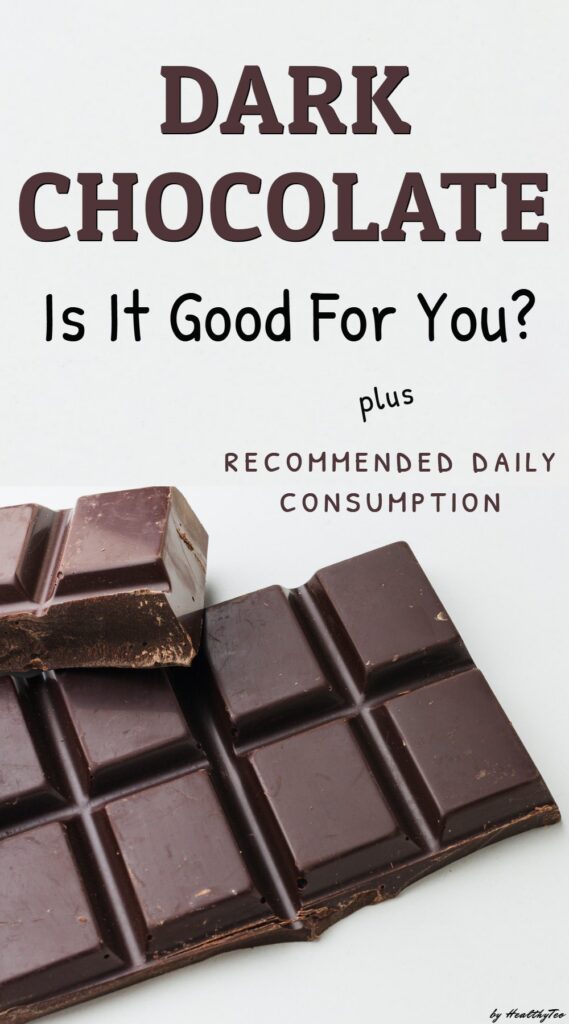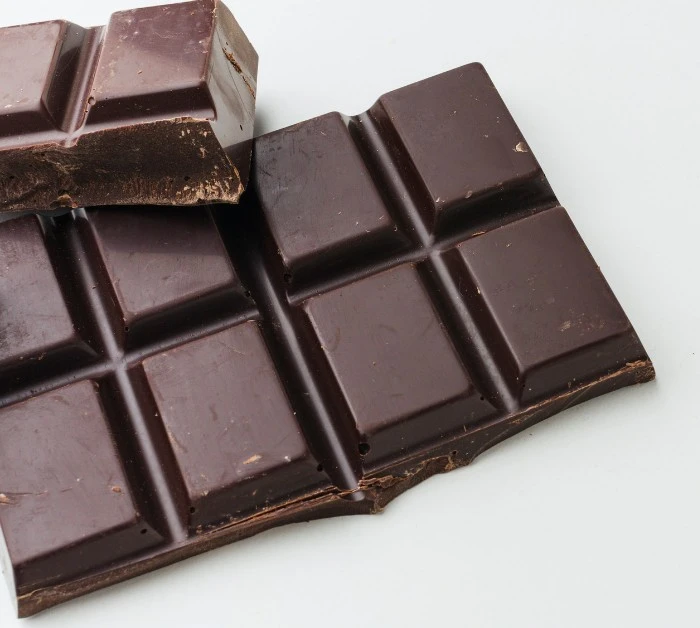Dark chocolate is chocolate that does not contain any milk solids. It is one of the finest antioxidant sources available. The key is portion control, and the highest quality must contain at least 70% cocoa.
Before we go through the fundamentals and understand what dark chocolate is, what are the different types, and whether it is good for you, let’s look at some interesting facts about dark chocolate:
- It was first used as a drink in Central and South America in approximately 1900 BC.
- In the early 1500s, the Spanish discovered chocolate and introduced it to Europe.
- Amedei Porcelana, dark chocolate created by the Amedei chocolatier of Tuscany, Italy, is often regarded as the most expensive chocolate in the world.
This post may contain affiliate links, which means we may receive a small commission, at no cost to you, if you make a purchase through a link. For more information, please see our disclosure.
What is Dark Chocolate?
Dark chocolate is a type of chocolate that contains between 50 and 90% cocoa solids, cocoa butter, and sugar. It does not include milk, as opposed to milk chocolate.
Contains less sugar than milk or white chocolate and is frequently regarded as a healthier chocolate bar and a preferable alternative to the more sugary milk or white chocolate.
White vs. Milk vs. Dark Chocolate

White chocolate is made from a combination of sugar, cocoa butter, milk products, vanilla, and a fatty component known as lecithin (an emulsifier that helps the ingredients blend together).
It is most notable for its delicate ivory color. Because the sugar is not balanced by the solids found in both milk and dark chocolate, it is theoretically the sweetest chocolate available.
Milk chocolate is made from cocoa solids, cocoa butter, milk in some form, and sugar. It is well-known for being sweet and creamy. To be called milk chocolate, chocolate must contain at least 12% milk.
Dark chocolate is known to have less sugar than both milk chocolate and white chocolate. It does not typically contain any sort of milk. As previously stated, it is made from cocoa solids, cocoa butter, and sugar.
Interesting to know
Ruby chocolate – Belgian chocolate manufacturer, Barry Callebaut, discovered a fourth type of chocolate, ruby chocolate, in 2017. This unique chocolate stands out from the rest with its red-pink hue. It’s not colored white chocolate, but a color obtained from a specific type of cacao – the ruby cocoa bean.
This popular new cacao variety is ideal for making bold, fruit-forward chocolate delicacies as well as bright Instagram-worthy chocolate confections.
Types of Dark Chocolate
The amount of cocoa solids in the bar differentiates different types of dark chocolate. Bittersweet, semi-sweet, and sweet dark chocolate are the most common varieties of dark chocolate.
Commercial dark chocolate bars can have cocoa contents ranging from 30% for sweet dark chocolate to 80% (or greater) for exceptionally dark, bitter bars.
- Semisweet Chocolate – is primarily found in North American supermarket stores. The cacao used in this product is of lower grade and is roasted darker to remove any off flavors, resulting in a more bitter profile. Semisweet chocolate has 60% cacao.
- Bittersweet Chocolate – The majority of brands that use this phrase sell chocolate with a cocoa content greater than 60% (usually 70% cacao). It also has less sugar than semisweet dark chocolate.
Bitterness increases as cacao content increases.
Is Dark Chocolate good for you?
Dark chocolate has a rather impressive list of health benefits, therefore it may be termed “good for you” and a healthy snack. Of course, if eaten in moderation!
Here’s why eating dark chocolate may be good for you:
Highly nutritious
If you choose high-quality dark chocolate with a high cocoa content, it is quite nutritious.
A 101 gram or 1 bar of 70-85 % cocoa dark chocolate contains:
- Calories: 605
- Protein: 7.9 g
- Carbohydrates: 46.3 g
- Total fat: 43.1 g
- Sugars: 24.2 g
- Manganese: 98% of the DV
- Copper: 89% of the DV
- Iron: 67% of the Dv
- Magnesium: 58% of the DV
It’s also high in phosphorus, potassium, selenium, and zinc.
1 bar of dark chocolate, or 101 grams, is a significant amount that should NOT BE consumed on a daily basis. As you can see, it contains approximately 600 calories and moderate amounts of sugar. As a result, it is advised to consume dark chocolate in MODERATION.
Dark chocolate includes stimulants such as caffeine and theobromine (a mild stimulant, acting similar to caffeine), but it is unlikely to keep you awake at night because the caffeine content is so low in comparison to coffee.
An excellent source of antioxidants
Dark chocolate contains a high concentration of organic compounds that are biologically active and act as antioxidants. Polyphenols, flavanols, and catechins are a few examples.
According to a study published in the Chemistry Central Journal, cocoa and dark chocolate included higher antioxidant activity, polyphenols, and flavanols than any other fruit studied, including blueberries and acai berries.
Antioxidants are important because they protect cells and tissues from free radical damage. Free radicals are unstable molecules that can alter and weaken cells. Consider them an insurance policy against the deterioration caused by stress, poor food, and the natural aging process.
Dark chocolate can be beneficial for heart health
Dark chocolate consumption on a regular basis may help minimize the risk of getting heart disease. Some of the components in dark chocolate, particularly flavanols, influence two key risk factors for heart disease: high blood pressure and high cholesterol.
- Blood pressure
Cocoa’s bioactive components may increase artery blood flow and induce a minor but considerable decrease in blood pressure.
A 2015 study looked at the impact of chocolate consumption in 60 persons with high blood pressure and type 2 diabetes. The researchers discovered that participants who consumed 25 grams of dark chocolate daily for 8 weeks had considerably lower blood pressure than those who consumed the same amount of white chocolate.
- Cholesterol
Dark chocolate also includes polyphenols and theobromine, which may lower LDL (“bad”) cholesterol levels in the body while increasing HDL cholesterol levels.
According to research published in the Journal of the American Heart Association, a handful of almonds, dark chocolate, and unsweetened cocoa reduced LDL cholesterol significantly.
We should note that many of the studies on chocolate and good cholesterol are short-term, and additional research is needed on this topic.
May improve cognition and boost your mood
According to studies, chocolate enhances neural activity in parts of the brain associated with pleasure and reward, which reduces stress and improves mood.
A comprehensive review found that five of eight studies on chocolate and mood showed benefits in mood and three showed “strong evidence of cognitive enhancement.” The high quantities of flavonoids in dark chocolate may be responsible for the improvements in brain function.
Keep in mind that the majority of research used far larger amounts of chocolate than the recommended daily consumption (1.5 ounces maximum).
It’s good for your skin
As previously stated, dark chocolate has vitamins and minerals that are helpful to your skin, such as copper, iron, and magnesium, to name a few. Manganese, for example, aids in the creation of collagen, whereas calcium aids in the repair and renewal of the skin.
Several studies have also discovered that dark chocolate’s strong antioxidant content may protect skin from the sun’s harmful ultraviolet (UV) rays.
What is the healthiest dark chocolate?
Dark chocolate with the highest cocoa percentage is usually the healthiest.
The higher the cacao content, the more beneficial nutrients there are, the less sugar there is, and the less potentially unhealthy components there are. Though keep in mind that the higher the percentage of cocoa solids, the greater the bitter flavor.
Choose 70% dark chocolate or higher to obtain the most flavanols.
Remember – even the darkest of the dark chocolates must be consumed in moderation.
Here you can shop high-quality dark chocolate – Green & Black’s Organic Dark Chocolate Bar with 85% Cacao, made with the best Trinitario cacao beans.
What is the daily recommended amount of dark chocolate?
The good portion size for dark chocolate is 30-40 grams (1-1.5 ounces). If you consume more than that, you may be consuming too many calories.
Considerations and risks
All of the research discussed above show substantial evidence that cocoa can give significant health benefits, particularly protection against heart disease.
Of course, this does not imply that you should overindulge in chocolate on a daily basis. It’s still high in calories and simple to consume too much of it.
The flavanols in dark chocolate are principally responsible for its health benefits. However, the flavanol concentration of dark chocolate products varies. The processing methods used by different producers might also vary the flavanol concentration of the chocolate.
Dark chocolate products with a higher proportion of cacao solids, on the other hand, should have more flavanols.
While dark chocolate includes antioxidants and minerals, it is also high in sugar and fat, making it a high-calorie snack. People should aim to limit their use of dark chocolate in order to prevent consuming too many calories, fats, and sugars.
You’ve got it now. According to research, eating dark chocolate on a daily basis can be beneficial to your health. There’s no need to wait for a special occasion. Eat some today!
Just remember to eat dark chocolate in moderation because it is still high in calories and easy to overeat.

Disclaimer: While we have looked into the research on the health benefits of this food, this is only for informational purposes and should not be construed as medical advice. Those with health-related questions should seek the advice of a medical professional.




